Yves here. The fact that more and more hand-wringing articles about populists are appearing in outlets that pretend to be politically neutral, like VoxEU, is telling. The elites hate democracy, because when they do a bad job of taking care of the needs of the lower orders, they go into revolt or at least opposition. It was not all that long ago that economic activity was less integrated, which meant both that mid-sized cities were important power center and that income inequality was vastly less pronounced. The result of both was that those at the top of the food chain were nearly always part of their communities. That in turn resulted in enough having a sense of noblesse oblige, and that in turn could alleviate demands for better treatment from lower income groups.
A bizarre blind spot in this piece is its depiction of anti-government narratives as somehow appearing in a mysterious way, ex nihilo, at best explained by distrust in institutions. They might better be analogized to the appearance of the fierce Spartoi fighters, who sprang up from ground sown with dragon’s teeth….as in there is agency which the authors refuse to recognize. As anyone who has been paying attention knows, the fossil fuel industry and its allies have pushed anti-climate change messages over decades, using the same agnotology “the science is not settled” playbook as the cigarette industry when evidence that its products were carcinogenic began to accumulate.
Similarly, the whinge about ‘simplified narratives overlooks that in the famed Powell Memorandum, which set out the framework for a long-term, open-ended campaign to move US value to the right to make them more business friendly, one device was to use Madison Avenue buzz phrases to make their ideas seem more appealing. One of innumerable examples: the neutral sounding “social programs” was rebranded as welfare-queen adjacent “entitlements”.
By Helios Herrera, Professor of Economics University Of Warwick and Federico Trombetta, Assistant Professor in Economics Università Cattolica Del Sacro Cuore. Originally published at VoxEU
The recent rise of populist movements in Western democracies has accompanied an erosion of trust in institutions and expertise. This column examines the dynamic between traditional policymaking – characterised by complex compromise – and the rise, persistence, and recurrence of populism, which tends to encourage extreme and simplistic policies without solid evidence. The link between distrust and ‘alt-truth’ engenders a trap whereby trust in the traditional political class never recovers, leading to a recurrence of populists in power. Surprisingly, this cycle sometimes benefits voters by having a disciplining effect on traditional politicians.
The last two years of the pandemic have shown, in no uncertain terms, the importance of trust in science and politics, as well as in social discourse, but also the fragility of this trust. […] [Our democracy] lives on solidarity and trust, and also trust in the facts.
Angela Merkel (2021)
Over the last decade, Western democracies have witnessed a significant erosion of trust in traditional institutions and expertise alongside a rise of populist movements. This trend is fuelled by scepticism toward elites and amplified by misinformation and social media platforms, which enable the spread of alternative narratives that conflict with established scientific and political norms. The debate highlights tensions between respecting the will of the people and ensuring that decisions are informed by evidence-based expertise.
Public trust in traditional politicians and political institutions shapes attitudes toward experts and scientific knowledge. For example, Bargain and Aminjonov (2020) find that European regions with low trust in government were less likely to comply with COVID-19 containment measures (see also Giuliano and Rasul 2020). When mainstream politicians are perceived as self-serving and disconnected from the working-class, this perception fosters broader scepticism, leading individuals to distrust scientific information, especially when it contradicts their pre-existing values or beliefs.
A lack of trust in experts can contribute to the spread of alternative narratives that lack evidence-based support. When individuals lose confidence in scientific information, they may become more inclined to endorse and share alternative viewpoints regardless of evidence. This dynamic is particularly concerning in the context of public health and climate change, where scientific insights are crucial for guiding policy decisions. The correlations illustrated in Figure 1 highlight how distrust in science often parallels distrust in political institutions.
Figure 1 Country-level correlation between trust in government and scepticism toward vaccines (top) and climate change (bottom)
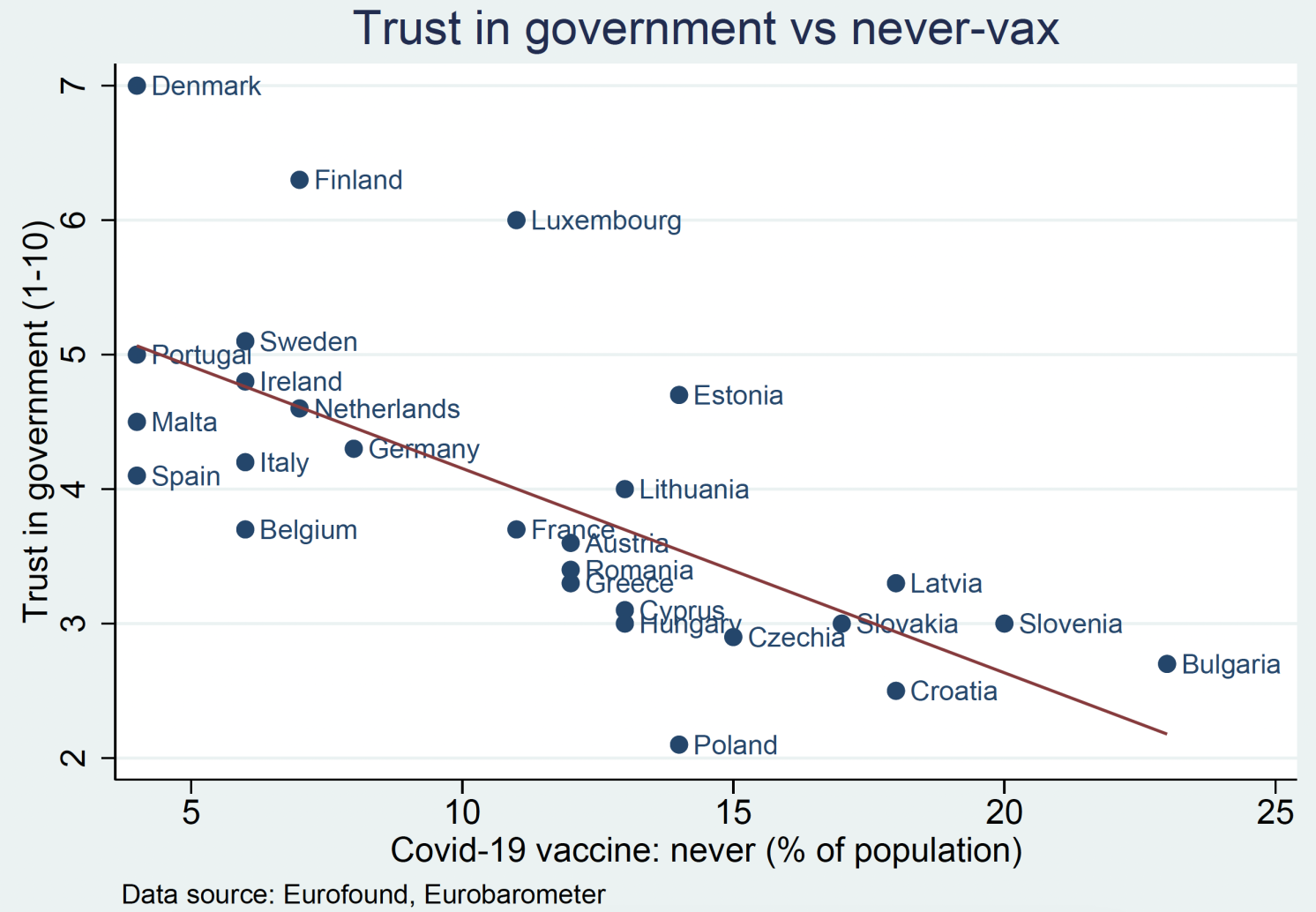
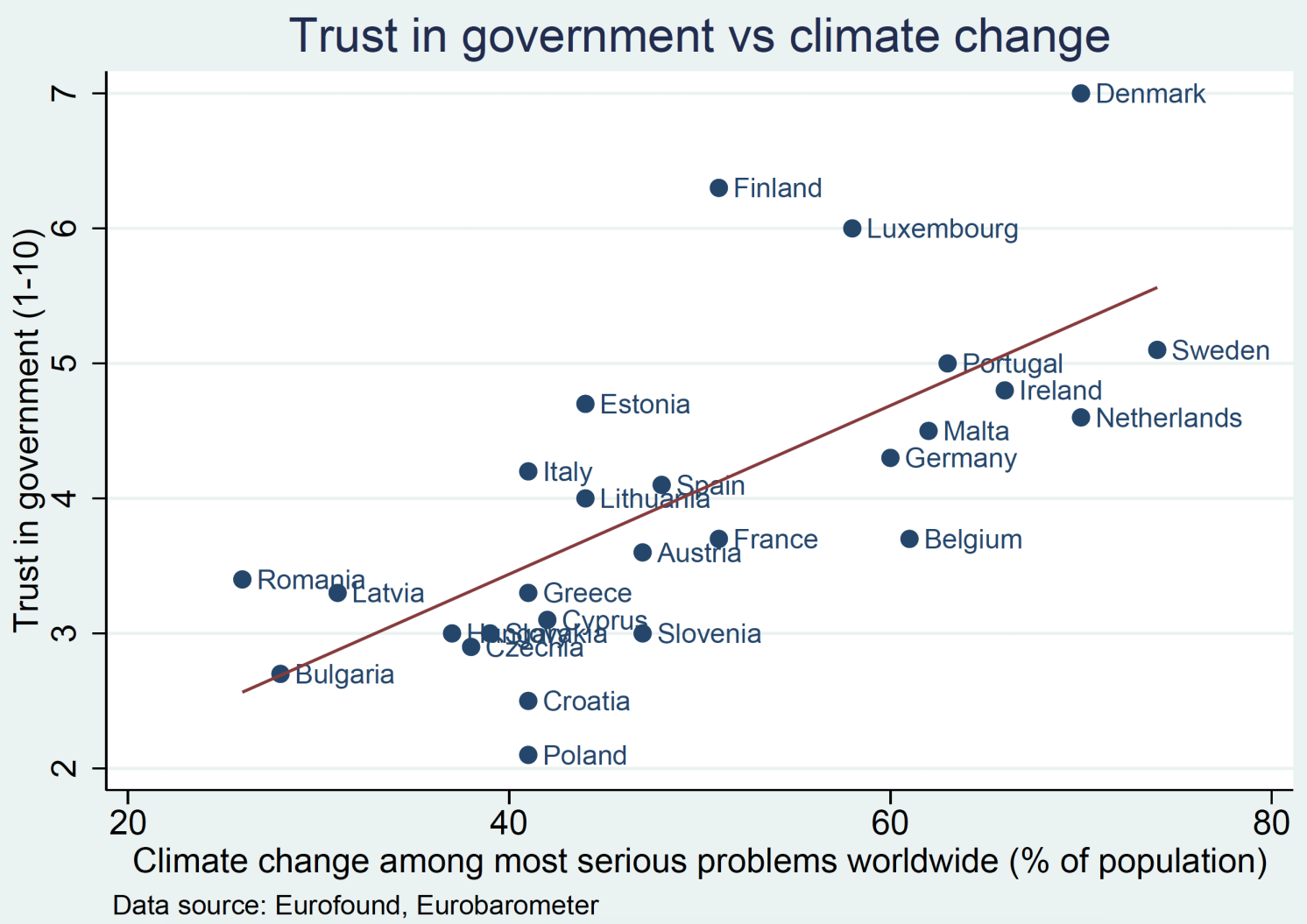
Notes: Insights drawn from country-level Eurostat data.
The embrace of alternative worldviews also influences economic policy, often leading to the promotion of policies that might be ineffective or counterproductive in the long run. When mainstream economic theories and expert advice are dismissed, there is a greater likelihood of public support for ideologically driven policies, which may lack empirical grounding and result in unforeseen negative consequences (Schularick et al. 2021). Namely, when traditional politicians are viewed as disconnected from the public or self-serving, it creates space for populist leaders – who offer alternative narratives with simplistic, draconian solutions very much at odds with sound economic policy – or for unqualified politicians (Svolik 2013).
Populism and the Rise of Simplified Narratives
Populist parties promote simplified, alternative worldviews. This definition aligns with the real-world tactics of populist politicians, but does not encompass all aspects of populism as defined in the broader literature. Populist leaders typically present themselves as advocates for the common people, proposing straightforward solutions to problems that mainstream politicians have failed to resolve (Guriev and Papaioannou 2022). They often push for extreme policies based more on emotional or ideological appeals than on robust economic principles, and they can gather substantial electoral support through these proposals. Figure 2 shows a clear negative correlation between trust in science/experts and the degree of populism in the party individuals choose to support.
Figure 2 Correlation between populist vote and trust in science (top) and experts (bottom)
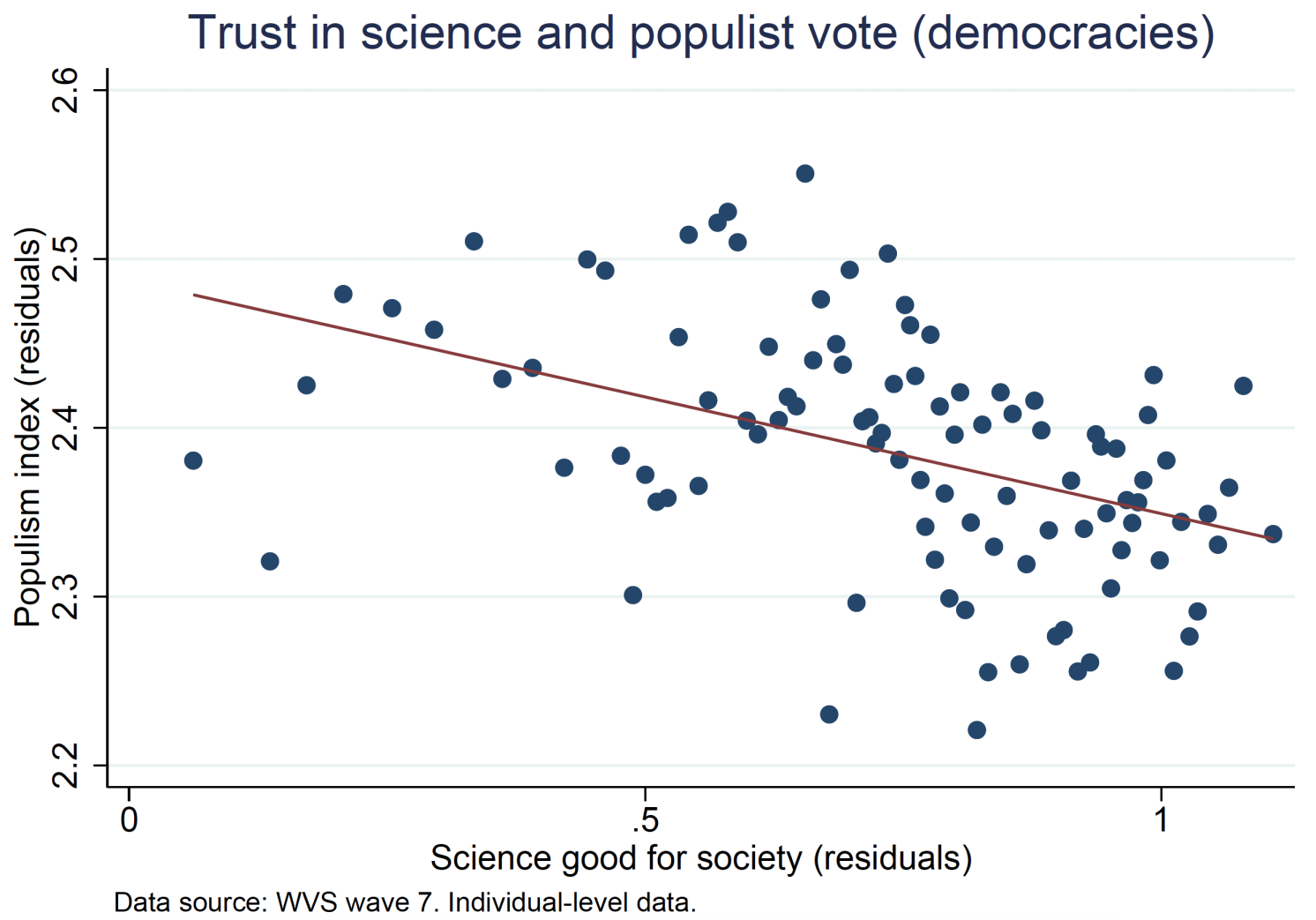
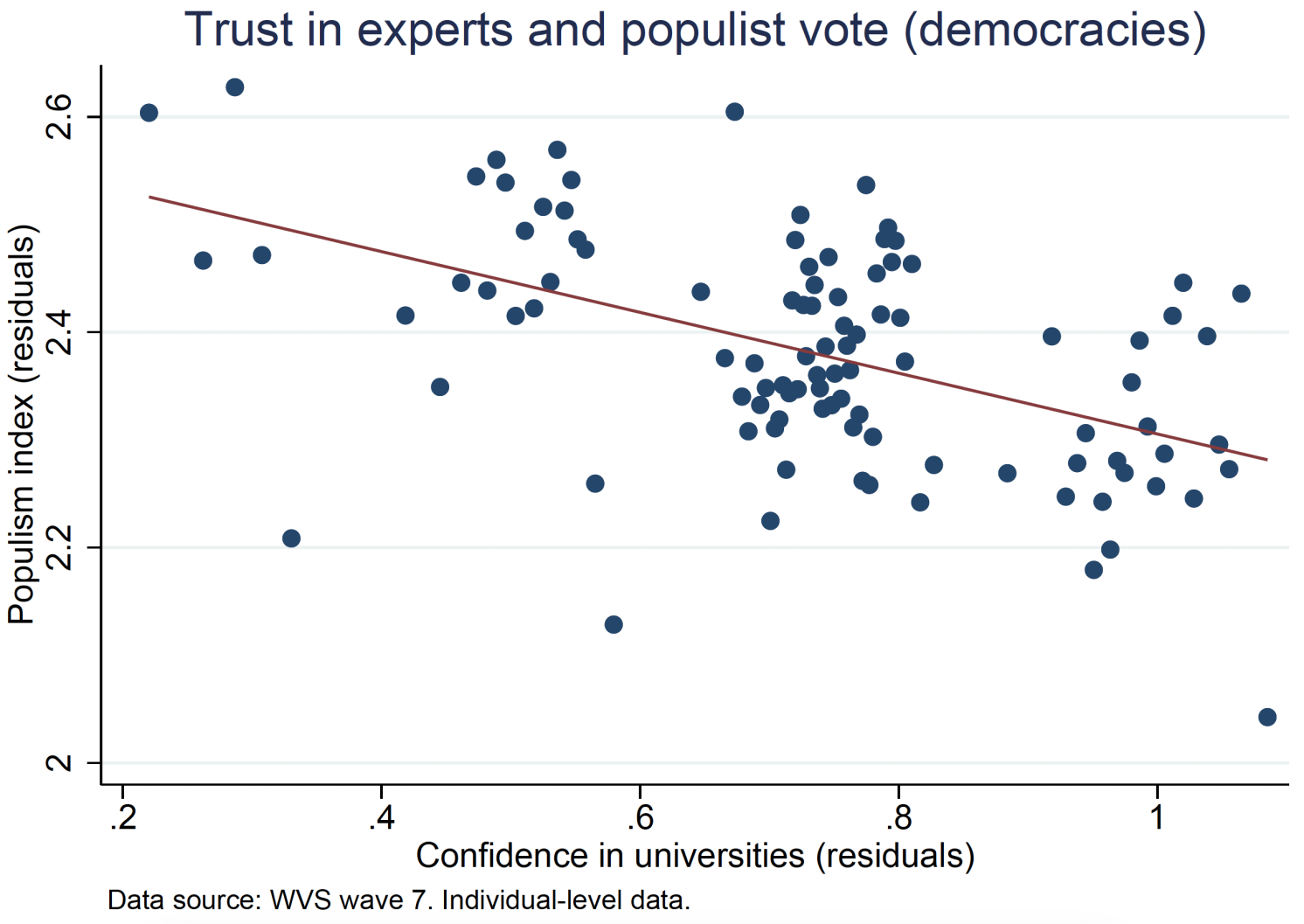
Notes: Both variables residualised with respect to age, gender, income, employment, political position, interpersonal trust, country FE, and survey mode FE.
Although populist policies may initially appeal to public discontent with the political status quo (Silva and Wratil 2023), their simplistic and drastic nature often leads to negative economic outcomes. Issues like trade, immigration, and environmental regulation are complex and require nuanced and balanced approaches. Populist policies that prioritise isolationism or closed borders (Fritz and Evenett 2019) may appear attractive but often result in significant inefficiencies and reduced economic growth. Similarly, policies that ignore environmental impacts in favour of short-term benefits can have detrimental effects on both the economy and the ecosystem.
The rise of new media has dramatically increased the visibility of simple alternative solutions. Unlike traditional media, which once acted as a gatekeeper of information, social media platforms allow populist politicians to directly reach and mobilise their supporters by appealing to emotions and grievances rather than presenting nuanced arguments. Empirical research suggests that the spread of broadband internet has contributed to the growth of populist support (Campante et al. 2018, Guriev et al. 2021). These platforms amplify the circulation of alternative narratives, which are known to spread more rapidly than evidence-based information (Vosoughi et al. 2018). Ideologically biased traditional media outlets also play a role in spreading and reinforcing different narratives, contributing to polarised beliefs (Djourelova et al. 2024).
Our Approach
Economic policies related to immigration, trade, and climate are inherently complex and difficult to address. The policy landscape on issues such as globalisation, border control, and climate change is fractured, cutting across traditional left-right political divides. While cultural differences persist, distinctions between left and right have become less pronounced in the realm of economic policy. However, the complexity of these issues raises public concerns amid an intricate landscape that politicians can exploit as cover for hidden agendas, manipulating policies for their own benefit (Acemoglu et al. 2013, Gratton et al. 2024). When issues are complicated and require constant balancing, it can be challenging for the public to draw clear inferences, which in turn breeds justified distrust toward mainstream politicians (Citrin and Stoker 2018). In fact, negative economic outcomes such as unemployment are correlated with populist voting and distrust of politicians (Dustmann et al. 2017, Algan et al. 2016). Moreover, political and interpersonal trust are both negatively correlated with voting for a populist party (Geurkink et al. 2020, Di Cocco et al. 2024).
In a recent paper (Herrera and Trombetta 2024), we construct a model that sheds light on the dynamics between traditional policymaking – characterised by complex, often biased compromises – and the rise, persistence, and recurrence of populism, which tends to propose extreme, simplistic policies that lack a solid evidence base (Levy et al. 2022). We seek to understand not only the factors behind the initial surge of populism and its relationship with distrust (Guiso et al. 2024, Bellodi et al. 2023), but also its aftermath, exploring the long-term consequences of these dynamics for societal welfare.
The Dynamics of Populism
In our model, voters hold ‘worldviews’ (Ash et al. 2021, Levy et al. 2022) on the correct model of reality, and use economic outcomes to update their beliefs about the level of trust in traditional politicians. Building on recent literature on worldview adoption and propaganda (Szeidl and Szucs 2024), we allow (dis)trust to increase the probability that a populist worldview is adopted. Combining this feature with a model of strategic traditional politicians, we can track the evolution of trust over time. Unlike the benchmark case without alternative worldviews – where trust converges to its true value and populists are rarely elected – we find that a completely different scenario may arise in which trust remains low and populists return to power, alternating with traditional politicians.
Figure 3 Evolution of trust over time when the populist worldview is absent or sufficiently weak (top), and when the populist worldview is sufficiently pervasive (bottom)
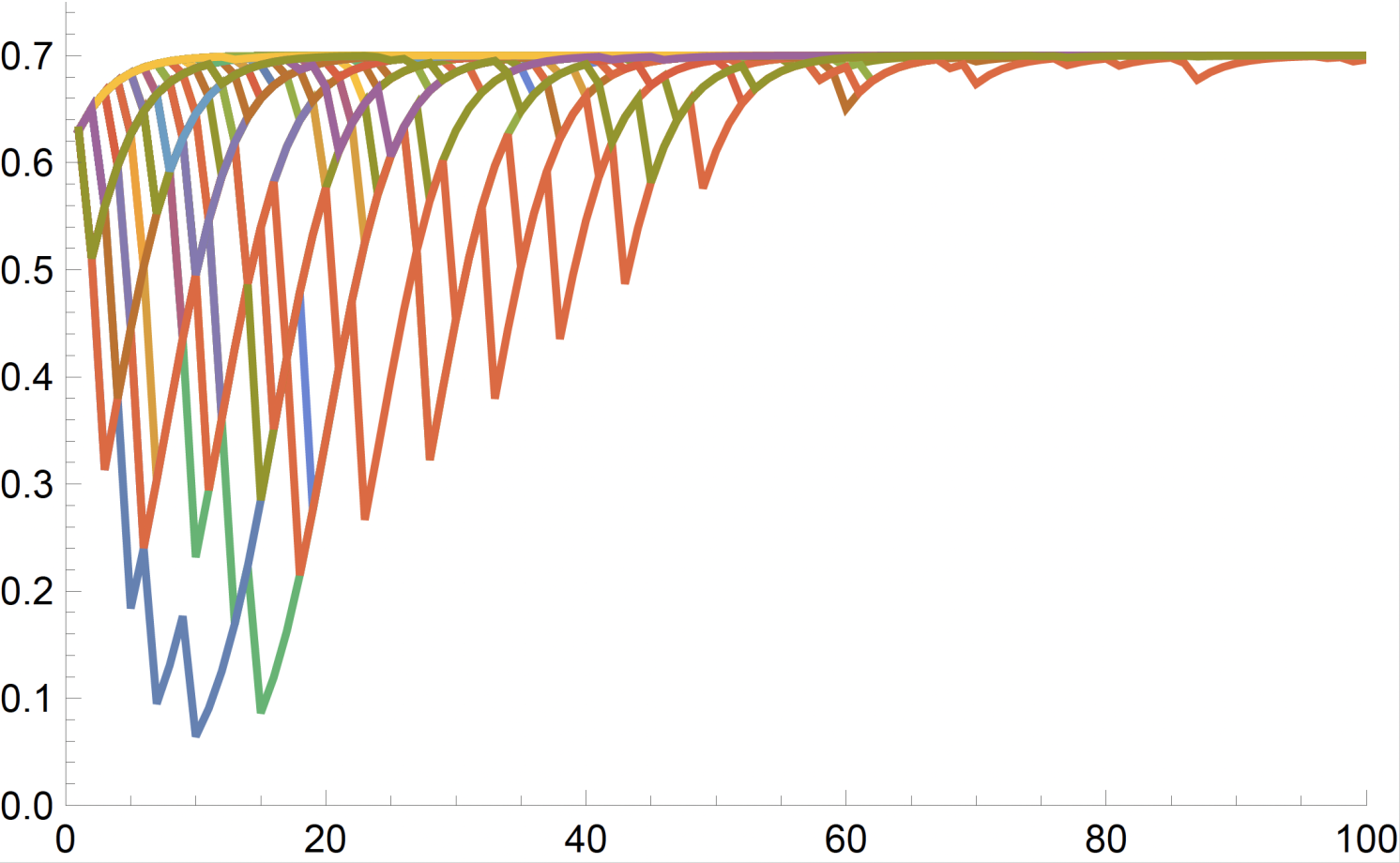
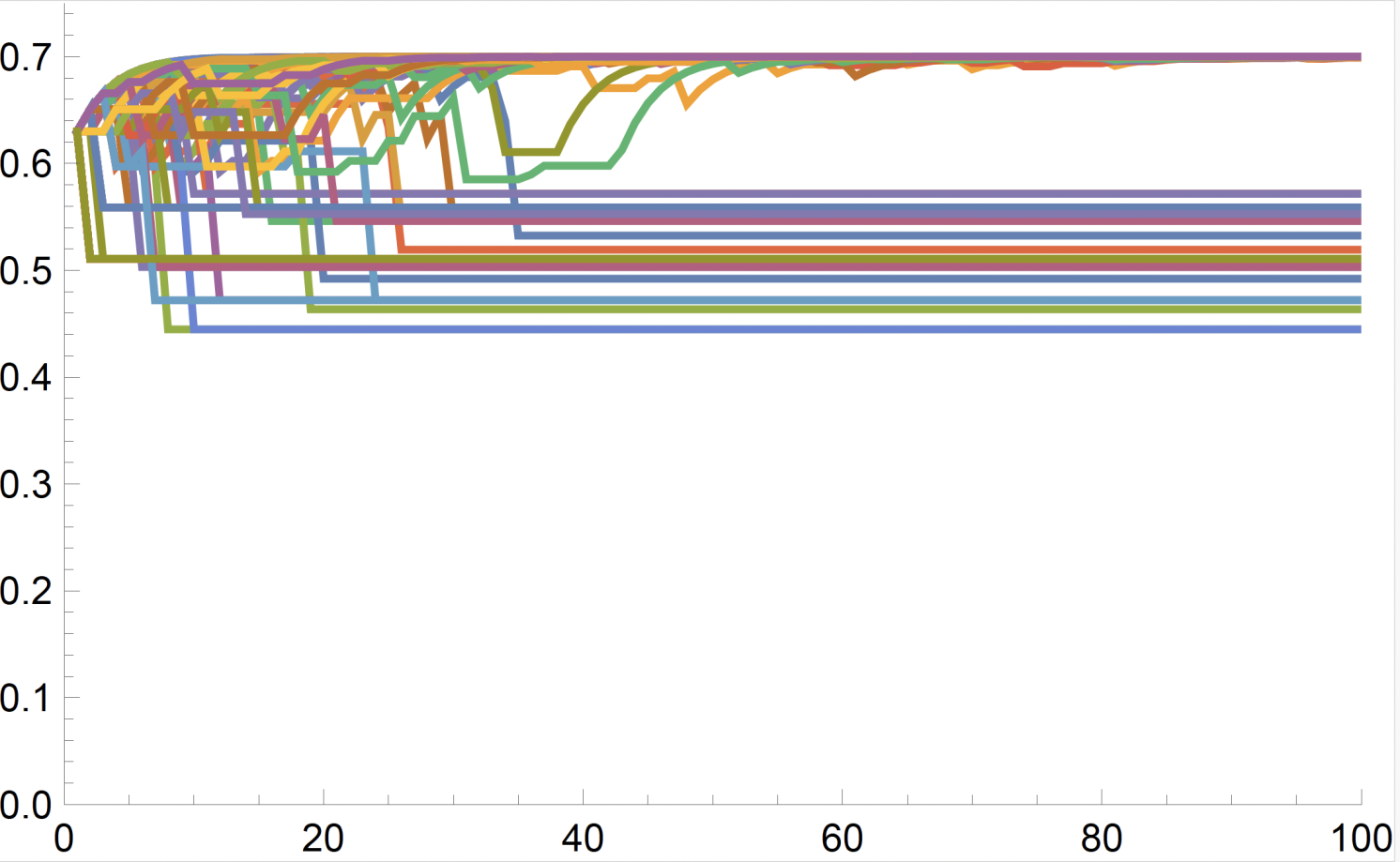
Key Insights
- Populist politicians as a check on traditional politicians: Although populist leaders typically deliver suboptimal outcomes compared to traditional politicians, their presence can serve as a corrective mechanism. Populists can pressure biased traditional politicians to improve their performance, acting as a form of discipline within the political system (see also Auriol et al. 2023).
- Trust traps and political cycles: When public trust falls below a certain threshold, populist politicians can trigger a ‘trust trap’, where political power alternates between traditional and populist leaders without restoring public trust. This cycle creates a self-reinforcing dynamic in which trust never fully recovers.
- Welfare impact of the populist cycle: While the populist cycle is often viewed negatively, it can sometimes yield unexpected benefits for voters. The pressure exerted by populists on traditional politicians may enhance their accountability. However, the overall impact on welfare depends on how far populist narratives diverge from reality and the extent of bias among traditional politicians.
- Discrepancy between perceived and actual welfare: Populist rhetoric tends to mislead voters, causing them to overestimate their well-being under populist governance. Although voters may feel that their situation has improved, their actual welfare outcomes often do not match these perceptions.
Application to Western democracies
Our findings have significant implications for several Western democracies, particularly the US, where public trust in political institutions has eroded in recent years. This decline has contributed to a recurring cycle of electoral shifts between Democrats and populist Republicans, a trend that is likely to continue. Trust levels have remained consistently low, as many voters believe the Democratic Party has become too aligned with corporate interests and disconnected from the concerns of working-class citizens. This growing disillusionment has been effectively harnessed by Republican candidates who adopt populist rhetoric, appealing to voters who feel excluded from the political system. These disaffected voters are the most inclined to embrace extreme and simplistic narratives on critical issues such as immigration, trade, and the environment, particularly those promoted by the MAGA faction of the Republican Party.
See original post for references


This research has confused correlation with causation. Erosion of trust is what gave rise to “populist” movements (i.e. voters kicking). Politicians being self serving is what lead to them being perceived as such. Economic outcomes are primarily what drive voters to their political worldviews (as opposed to desperate propaganda efforts to confuse them on this point).
Finally, the effort to tie the reputations of politicians to of all things the scientific method has to be one of the most bizarre conflations I’ve seen attempted in these debates yet. The only connection in this regard was the deliberate politicization of science by the political class in its efforts to shore up its already shaky reputation.
There is a wider intellectual movement to put democracy back in a box. These areticles are part of it.
Kiss up much?? The author assumes that only ‘populists’ adopt ‘simplistic solutions’, thereby implying that the Covid vax is sterilizing and that sequestration or EVs have been effective ‘complex’ and ‘scientific’ solutions.
There is also an alt-media trap. I don’t know what the truth is.
What a load of BS.
So, populist leaders lead to more sub-optimal outcomes than traditional politicians…. Really?
What part of the 21st century did this happen in?
The :
wars, invasions, lies, propaganda, economic collapses, genocide, color revolutions, labs leaking virus, censorship,
destruction of the environment, weaponization of government, electoral frauds, etc….. that is the bread and butter of “traditional” politicians….
And for these preening idiots to ascribe “simple”… to the populists…. wow!
Could this article be a reflection of “journalists” getting the memo to report in a specific manner?
In the last few weeks, Vox Media is going through additional layoffs. According to Business Insider, CEO Jim Bankoff stated, “As was the case this year, in 2025 we will continue to invest in our business where we see the clearest opportunities: editorial and user experiences that build loyal, direct audiences; a high-value advertising proposition based on unique intellectual property; strong brands that command audience attention; leading multimedia productions like we’re building with the Vox Media Podcast Network; and consumer-direct businesses to diversify revenue streams and grow recurring revenue.”
Then, “While our focus on improving our financial strength is always a priority, this year we have made meaningful progress to ensure our long-term profitability.”
This is the second round of layoffs at Vox Media.
Vox Media won’t even need “journalists” to write this kind of dreck. It’s exactly what AI is best at.
it is easier to attain and maintain social rights, once economic rights have been secured.
i actually believe that many back in 1993, were actual believers in the kool aid that bill clinton/tony blair types were peddling, and many today, still believe in that kool aid.
all that the bill clinton/tony blair types did, was to bring america and the world back to the pre civil war era of slavery and colonialism, and they are shocked at the results of their own policy beliefs, yet blame others.
ALL mass messaging is “simplified” by necessity — not just the messaging offered by those outside of mainstream political parties.
And this entire exercise is typical, focused as it is upon communication rather than concrete material benefits. I propose that it is the failure of the neoliberal, “radical centrists” of the “Uniparty” to provide sufficient concrete material benefits for enough of the citizenry which gives rise to democratic revolt — and it’s this democratic revolt that “our betters” sneeringly refer to as “populism.”
As Yves notes in her introduction, one glaring omission in this article are the *elite* sources of “populist” beliefs, the massive ideological mobilization by corporations, conservatives, and billionaires since the 1970s (the Powell memo being one notable clarion call). There have been tremendous resources devoted to PR campaigns, countless “think tanks,” recruitment of friendly “experts” to muddy the “science,” concentrated money supporting pseudo-populist politicians, etc., that have gone into creating the “simplistic” worldview of the masses on “complex” issues such as government regulation, immigration, or climate change.
But just as relevant these days is the other glaring omission with which NC readers are very familiar but about which academics like these authors are oblivious. That is the fact that the Establishment “experts” whom the authors would have us “trust” have also shown themselves to be untrustworthy by lying to us. I found it especially humorous that these two economists were apparently referring to *economic* policy, of all things, when mourning loss of trust in “science” and its “experts.” I remember clearly all those liberal, highly-credentialed experts explaining to us how financial deregulation and “free trade” agreements like NAFTA would help us all. I remember them explaining why socialized medicine is unrealistic (we simple-minded “populists” just didn’t understand economics) and why reliance on markets was necessary. For our neoliberal “experts,” it was just the reality we were too dumb to understand -TINA!
And this is before we even get into the foreign policy realm and all the official lies by our “traditional” political leaders and institutional elite “experts” on what was going on in places like Iraq, Syria, Libya, Ukraine, Israel, etc. Or how about all those institutional “experts” in government and the media explaining to us how the Russians stole the election in 2016, or how they colluded with the winner of that election, or how they deviously planted false stories about poor Hunter Biden, and so on. That some people started calling out these lies has been a driving force behind the expansion of our surveillance and censorship capabilities. But to these authors such an argument would represent a simplistic “populist” conspiracy theory; for them our “experts” are only trying to limit the effects of populist “disinformation.”
As always, the most aggravating thing about articles like this is not that they omit these things, but that they think *they* are the ones supporting “truth” and “science” while patting *us* on the head condescendingly.
Far out. Love it.
BINGO!!!
“The exploitation of the middle class for the profit of the ruling class and the amusement of the working class”. (Hugh Kingsmill on Lord Randolph Churchill’s “New Tory Democracy”).
Could be applied to much of what currently passes for “populism”.
When NYC public health officials “party on” during COVID lockdowns, when CEOs outsource jobs to China and then scaremonger about the “threat” from China, when laws are proposed to mandate EVs and take away gas stoves and yet the wealthy fly hither and yon and “defense” activities increase, what other message are we to take? If the elites walked the talk, there might be more compliance.
The article anthropomorphizes “Science” as if it is some kind of religious figure, without noting that science is a process that requires distrust in its own findings, thus the process of peer review and other checks.
What people don’t trust is not science, but agenda and profit driven scientists who act unethically for profit or power.
Classic examples include Fauci’s behavior before and during COVID, the lack of transparency about gain of function, and of course the unethical behavior of Pfizer and similar medical and pharmaceutical megacorps.
What part of science is it when the scientific findings of a company like Pfizer have to be shielded for 75 years from review by other scientists? What part of science is it when distinguished scientists are blackballed for dissenting from a profit driven corporation’s narrative, a narrative which is forced down the throats of institutions like the FDA and CDC via corporate capture? These are the shenanigans of purported scientists who are acting more like greedy and self interested politicians than what they claim to be.
So called “science” is not a religious figure to be trusted like a God. It is a process that, when done unethically and in violation of its own time honed processes (in other words, denying and skipping steps), cannot be trusted. Indeed, any real scientist absent such unethical motives would be horrified to have her findings simply put forward as the word on high without being tested and rigorously subjected to peer review reproducible results.
Distrust is part of the scientific process for Pete’s sake! This is what angers me so much about the magpie like squawking of the PMC class about trust and obedience.
Science, democracy and journalism, when done correctly, all share one thing in common: They are all adversarial processes. And it’s not that the public doesn’t trust those, it’s that the public rejects the shibboleths that the elites have made of them. We’ve seen the term “democracy” abused in the shoddiest and most self serving way possible by the Democratic Party in the process of trying to shove Kamala Harris down all our throats, and of course earlier abuses. Science is no different, it’s put up like a God by people including these authors; no, it’s not “science” the public no longer trusts, but greedy and unethical people not following the scientific method, and calling it science. And the process of abusing journalism is now evident to all.
What is interesting is that the attacks on the shibboleths made of Democracy, Science and Journalism is, it’s all about Obedience.
the Democratic Party has become too aligned with corporate interests and disconnected from the concerns of working-class citizens. This growing disillusionment has been effectively harnessed by Republican candidates
Correct me if I’m wrong, but trump got basically the same vote total all three times he ran, but won because the dems lost voters…the republicans didn’t “harness” anything, the dems opened the barn door and shooed away the horses. Biden did well IMO because all the whingeing about trump would finally come to an end when “the adults” got back into the room. No such luck on those points, so here we are, with people like this gazing at their navel rather than looking in the mirror.
Pre-assuming what you aim to deduce in order to reach the conclusions you want can be called many things.
Science and the scientific method ain’t one of them.
As per Yes, Minister it’s “policy based evidence making” …
Listen, Liberal
followed by
Listen, Populist
Collect the whole set!
Since we seem to be reluctantly stumbling into a period of self-examination, Helio Herra and Federico Trombetta might ask themselves about the origins of their false notion that their understanding of complex issues represents the real will and interest of the public.
It may just be the case that their perception of themselves as independent thinkers who come to their positions through thoughtful evaluation of the facts is mistaken.
I would argue that the more education you have, the greater your chance of being some form of rigid ideologue and/or a partisan conformist of some sort.
Orwell once quipped that many ideas are so patently ridiculous that only an intellectual would give them the time of day.
When mainstream economic theories and expert advice are dismissed, there is a greater likelihood of public support for ideologically driven policies…
Needless to say, those “mainstream economic theories” are never “ideologically driven”.
Heh.